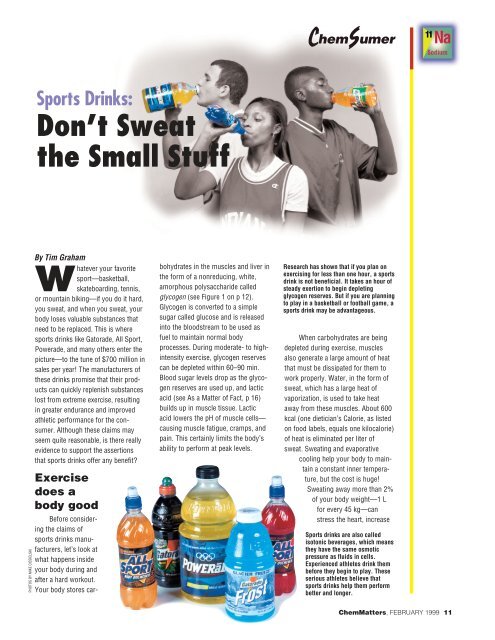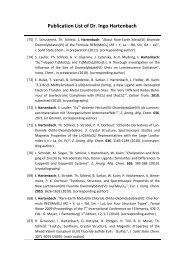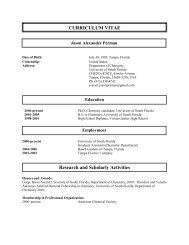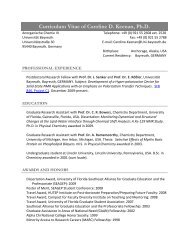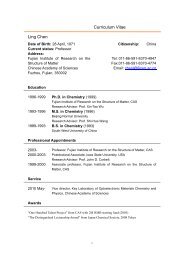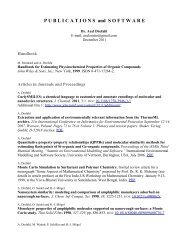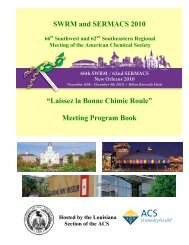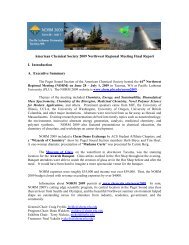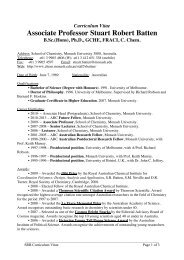Sports Drinks: Don't Sweat the Small Stuff - American Chemical ...
Sports Drinks: Don't Sweat the Small Stuff - American Chemical ...
Sports Drinks: Don't Sweat the Small Stuff - American Chemical ...
Create successful ePaper yourself
Turn your PDF publications into a flip-book with our unique Google optimized e-Paper software.
PHOTOS BY MIKE CIESIELSKI<br />
<strong>Sports</strong> <strong>Drinks</strong>:<br />
Don’t <strong>Sweat</strong><br />
<strong>the</strong> <strong>Small</strong> <strong>Stuff</strong><br />
By Tim Graham<br />
Whatever your favorite<br />
sport—basketball,<br />
skateboarding, tennis,<br />
or mountain biking—if you do it hard,<br />
you sweat, and when you sweat, your<br />
body loses valuable substances that<br />
need to be replaced. This is where<br />
sports drinks like Gatorade, All Sport,<br />
Powerade, and many o<strong>the</strong>rs enter <strong>the</strong><br />
picture—to <strong>the</strong> tune of $700 million in<br />
sales per year! The manufacturers of<br />
<strong>the</strong>se drinks promise that <strong>the</strong>ir products<br />
can quickly replenish substances<br />
lost from extreme exercise, resulting<br />
in greater endurance and improved<br />
athletic performance for <strong>the</strong> consumer.<br />
Although <strong>the</strong>se claims may<br />
seem quite reasonable, is <strong>the</strong>re really<br />
evidence to support <strong>the</strong> assertions<br />
that sports drinks offer any benefit?<br />
Exercise<br />
does a<br />
body good<br />
Before considering<br />
<strong>the</strong> claims of<br />
sports drinks manufacturers,<br />
let’s look at<br />
what happens inside<br />
your body during and<br />
after a hard workout.<br />
Your body stores car-<br />
bohydrates in <strong>the</strong> muscles and liver in<br />
<strong>the</strong> form of a nonreducing, white,<br />
amorphous polysaccharide called<br />
glycogen (see Figure 1 on p 12).<br />
Glycogen is converted to a simple<br />
sugar called glucose and is released<br />
into <strong>the</strong> bloodstream to be used as<br />
fuel to maintain normal body<br />
processes. During moderate- to highintensity<br />
exercise, glycogen reserves<br />
can be depleted within 60–90 min.<br />
Blood sugar levels drop as <strong>the</strong> glycogen<br />
reserves are used up, and lactic<br />
acid (see As a Matter of Fact, p 16)<br />
builds up in muscle tissue. Lactic<br />
acid lowers <strong>the</strong> pH of muscle cells—<br />
causing muscle fatigue, cramps, and<br />
pain. This certainly limits <strong>the</strong> body’s<br />
ability to perform at peak levels.<br />
ChemSumer Research has shown that if you plan on<br />
exercising for less than one hour, a sports<br />
drink is not beneficial. It takes an hour of<br />
steady exertion to begin depleting<br />
glycogen reserves. But if you are planning<br />
to play in a basketball or football game, a<br />
sports drink may be advantageous.<br />
When carbohydrates are being<br />
depleted during exercise, muscles<br />
also generate a large amount of heat<br />
that must be dissipated for <strong>the</strong>m to<br />
work properly. Water, in <strong>the</strong> form of<br />
sweat, which has a large heat of<br />
vaporization, is used to take heat<br />
away from <strong>the</strong>se muscles. About 600<br />
kcal (one dietician’s Calorie, as listed<br />
on food labels, equals one kilocalorie)<br />
of heat is eliminated per liter of<br />
sweat. <strong>Sweat</strong>ing and evaporative<br />
cooling help your body to maintain<br />
a constant inner temperature,<br />
but <strong>the</strong> cost is huge!<br />
<strong>Sweat</strong>ing away more than 2%<br />
of your body weight—1 L<br />
for every 45 kg—can<br />
stress <strong>the</strong> heart, increase<br />
<strong>Sports</strong> drinks are also called<br />
isotonic beverages, which means<br />
<strong>the</strong>y have <strong>the</strong> same osmotic<br />
pressure as fluids in cells.<br />
Experienced athletes drink <strong>the</strong>m<br />
before <strong>the</strong>y begin to play. These<br />
serious athletes believe that<br />
sports drinks help <strong>the</strong>m perform<br />
better and longer.<br />
ChemMatters, FEBRUARY 1999 11


